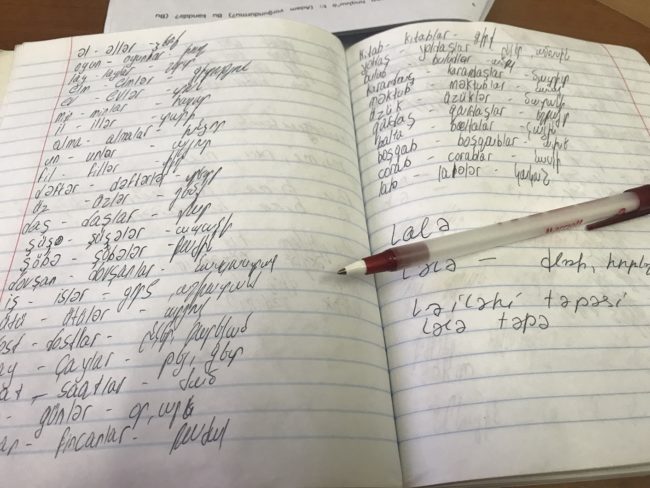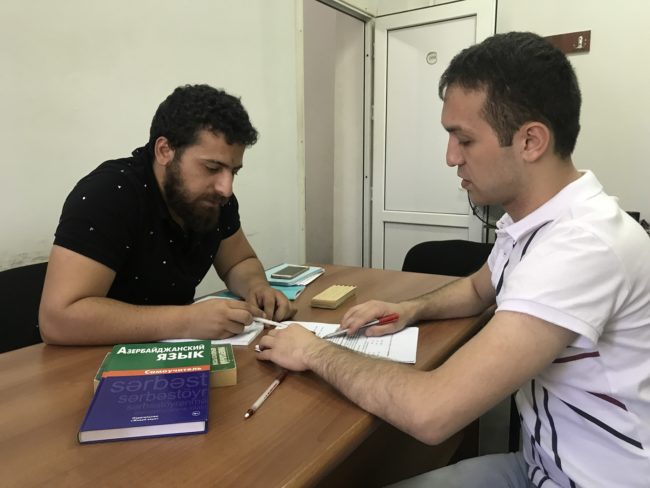
 Learning Azerbaijani is becoming more and more popular in Armenia. While the two countries remain in a near-war-like state, some emphasise the strategic importance of ‘know thy enemy’, while others seek a better understanding of their disconnected neighbours.
Learning Azerbaijani is becoming more and more popular in Armenia. While the two countries remain in a near-war-like state, some emphasise the strategic importance of ‘know thy enemy’, while others seek a better understanding of their disconnected neighbours.
For the first time in 2012, an Azerbaijani language textbook was published in Armenia. The book was the initiative of the Chair of Turkish Studies at Yerevan State University. It has been certified to be of an academic level by the university's Academic Council. The textbook is in great demand today, as the desire to learn Azerbaijani is increasing day by day in Armenia.
Learning Azerbaijani
Twenty-eight-year-old economist Ashot Asatryan has been attending private Azerbaijani lessons for two months. At first he tried to learn the language on his own, but was unable to master it through online programmes alone.
‘I read news written on Azerbaijani websites a lot. At one point it was just a hobby. Then I began to actively follow developments in Azerbaijan, whether political or military. I translated the most interesting parts of the news into Armenian and posted them on my Facebook page. My notes were quickly reprinted on Armenian websites. Over time, I went from being a consumer to a distributor of information, and started to study the Azerbaijani-language articles. At that time I realised that I should learn the language, because the translations from Google Translate cannot always be trusted’, Asatryan told OC Media. Previously, he read mostly Russian-language articles, but is now able to read and translate from Azerbaijani.
During his two months of study, Ashot has gained a solid grasp of Azerbaijani grammar, and is now working on enriching his vocabulary. The entire course lasts six months, for which he will pay $300.
‘I am attending individual classes, but there are also a few groups learning the language through another programme. I know many young people who are interested in Azerbaijani like me. I aim to open a specialised language group after learning the language properly, which will teach Azerbaijani’, says Asatryan.

‘Strategic importance’
Interest in Azerbaijani has intensified in Armenia — especially after the 2016 Four-Day War. Interest in news from Azerbaijan has spiked, with many people wishing to get a clearer image of what is going on in the ‘enemy country’. People are interested in any kind of news about Azerbaijan, social, political, or military.
‘Our countries are on opposite sides of the conflict, so the presence of experts knowing each other’s language is of strategic importance. Besides, I always say that you need to know your neighbour’s language to communicate and talk with them — it will give you an advantage. The more I talked with Azerbaijanis, the more I felt their discomfort, because I was always one step ahead of them — I have mastered their native language’, Ashot Movsisyan, Asatryan’s Azerbaijani teacher told OC Media.
‘My first teacher was my grandmother’
Movsisyan, 24, is a Turkologist by training. He graduated from Yerevan State University’s Department of Turkology. From an early age, Movsisyan showed an interest in Azerbaijan and its language. After showing an interest, he began to learn a few words.
‘My first “teacher” of Azerbaijani was my grandmother, from whom I learned the numbers. Then my father helped me a lot, thanks to which my knowledge of the language steadily increased over the years. I remember one day, my father was watching a programme about the Azerbaijani army on Azerbaijani TV and I asked many questions. My questions were so numerous that my father refused to continue translating and changed the channel. On that day I promised to myself that I would learn the language to understand and communicate with my Azerbaijani counterparts. At first, I learned the language as a linguist without textbooks — TV channels helped a lot. Studying Turkish at university has also helped me learn Azerbaijani faster, because these two languages are very similar’, he says.
According to Movsisyan, it is easy for Armenians to learn Azerbaijani, as there are a number of linguistic similarities. It was easier still for him, he says, because there are many words of Turkish and Persian origin in his dialect (the Artsakh dialect of southern Armenia and Nagorno-Karabakh).
‘It also helped me to master Azerbaijani more easily. For some Armenians, some of the sounds are bit of a challenge, and learning it requires hard work’, says Movsisyan. It takes years to master the language and to be able to apply it practically, he says.
For the latter, the problem is complicated. Azerbaijanis and Armenians, as warring sides in the conflict over Nagorno-Karabakh, have practically no contact.
Learning more than just the language
Yerevan State University's Faculty of Oriental Studies has offered courses in Azerbaijani language since 2008. When they first began, Azerbaijani was taught as a second eastern language in the department of Turkology, and for the last two years, an Azerbaijani Studies programme has also been offered.
‘In 2 years, the first students will graduate from this programme. I’m happy to say that many people are interested in it, and we are implementing it together with the Ministry of Defence, providing four free places with this funding. We are teaching at a high level. While in the past there were no appropriate textbooks, for the last five years we have had a specialised book which is purely educational. The course includes the situation of the national minorities in Azerbaijan, politics towards them, as well as domestic policy in Azerbaijan’, Ruben Melkonyan, deputy rector of the Faculty of Oriental Studies told OC Media.
According to Melkonyan, the strategic significance of studying Azerbaijani goes without saying, as Azerbaijan is both a neighbour and enemy of Armenia. He says that the study and teaching of the Azerbaijani language also has important scientific and political significance.
The Chair of Turkish Studies at Yerevan State University was founded in 1991. In 2010, the Chair was reorganised into the Chair of Turkic Studies, which teaches the literature, culture, and history of Turkish, Ottoman, Azerbaijani, Kazakh, and other Turkic peoples.
All place names and terminology used in this article are the words of the author alone, and may not necessarily reflect the views of OC Media’s editorial board.




 22 July 2017
22 July 2017




